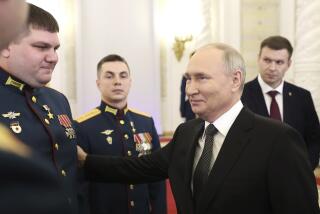Gorbachev Is Resisted on Stronger Presidency : Soviet Union: Liberal lawmakers force a delay of the session to consider constitutional changes.
- Share via
MOSCOW — Soviet President Mikhail S. Gorbachev met serious resistance Wednesday in his bid for greater powers as liberal lawmakers criticized his plan for a Western-style, executive presidency and forced a postponement of the parliamentary session that would consider the required constitutional amendments.
Although Gorbachev had argued forcefully for the enhanced authority of an executive presidency, liberal members of the Supreme Soviet, the country’s Parliament, balked at pushing the measures through in just two weeks and called for more study and a broader debate.
“Unless democracy is strengthened and ensured by corresponding mechanisms, democracy will perish, and we will lose,” Gorbachev told Parliament, stressing the need to strengthen the presidency as a way to broaden and accelerate perestroika, as his program of political and economic reforms is known.
“Today is the time to decide all these questions,” Gorbachev declared, contending that greater powers are needed to break through the Soviet Union’s multiple crises. “More time, more delay could finish off the country.”
But the Supreme Soviet, which has proved itself increasingly independent of the Communist Party leadership, and in the process has become a stronger political force than was expected at its creation less than a year ago, showed signs that it might refuse to give Gorbachev all the authority he is seeking and forced a postponement of the whole issue.
The fear among liberals is that Gorbachev and his successors might have almost dictatorial powers, unchecked by either the still evolving legislative or judicial branches of the new Soviet political system.
“The Russians, in particular, want to strengthen central power because they traditionally think in those terms,” commented Ilmars Bisers, a Latvian deputy and constitutional expert. “There are those who almost talk about wanting a new czar.”
Nevertheless, even critics of Gorbachev’s proposals acknowledged that they probably could do little more, if they are not satisfied, than force some refinement of the new system and perhaps a short delay. The party commands a solid majority in both the 542-member Supreme Soviet and Congress of People’s Deputies, the national legislature, which has 2,250 members.
The proposal to give the Soviet president far greater executive powers was made by the party’s policy-making Central Committee last week as one of a series of constitutional changes that also include yielding the party’s monopoly on power.
The new presidency is initially to be filled by a vote of the Congress of People’s Deputies but subsequently by direct popular election. Gorbachev is likely to be a candidate for the post, but for the second time in a week, he spoke cautiously about whether he would run.
“If we proceed to take a decision on the presidency, we will decide there will be alternative candidates,” Gorbachev said. “I do not know whether I will be among the alternatives.”
The Inter-Regional Group of Deputies, which functions as a parliamentary opposition in many ways, introduced a petition calling for direct election of the president with a choice of candidates and assured secrecy of the ballot.
As criticism mounted of what many liberals saw as hasty action on poorly drafted legislation, Gorbachev dropped the proposal for an immediate decision on convening a special session Feb. 27 of the Congress of People’s Deputies. Originally, Vice President Anatoly I. Lukyanov had proposed, on behalf of the leadership, that the Congress meet on that day to amend the constitution and then to elect a president to the new post.
Instead, after a raucous debate, deputies voted 304-95 to review the draft constitutional amendments and then to consider when to hold the special session.
“Nothing has been prepared, and we have not yet seen the precise proposals on what kind of president we will have,” Bisers, the constitutional expert, complained. “There are lots of different models of president--from (Augusto) Pinochet (of Chile), to the American, the Italian or the French kind, although I suspect the presidency being proposed here is one that will have very strong executive powers.”
Anatoly A. Sobchak, a liberal deputy from Leningrad, said that increasing the powers of the executive branch would necessarily diminish those of the legislature, even while it is still evolving. He urged establishment of a national security council to deal with the crises.
And Vladimir I. Kirilov, a deputy from the central Russian city of Voronezh, said that before discussing the strengthened presidency, the Congress should end the Communist Party’s effective control of the Soviet armed forces and the KGB, the security and intelligence service, to prevent an over-concentration of power.
The sharpness of the criticism appeared to have both startled and annoyed Gorbachev, who said he thought there was broad support for strengthening the decision-making structure.
He himself had rejected the idea of presidential government less than two years ago, he recalled, but had changed his mind because of the difficulty in putting the reforms into action.
“Life requires changes, and I think we have reached a point when we need the most decisive ones,” he said.
More to Read
Sign up for Essential California
The most important California stories and recommendations in your inbox every morning.
You may occasionally receive promotional content from the Los Angeles Times.













